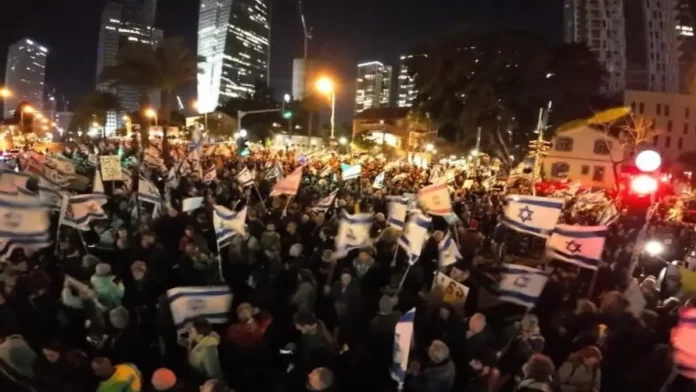In a poignant display of emotion and determination, the weekly rally in Tel Aviv demanding the return of hostages from Gaza saw a significant shift. Organizers, for the first time, relinquished the stage entirely to the relatives of over 40 families whose loved ones were abducted.
The 19th consecutive gathering at Tel Aviv’s Hostages Square on Saturday broke from tradition, foregoing musical interludes and speeches by security experts. Instead, the thousands in attendance listened to heartfelt addresses from the relatives themselves. Their voices, unfiltered and raw, provided a glimpse into the diverse opinions among families advocating for a hostage release deal. Some urged for any means necessary, while others hesitated, revealing the deep anguish and uncertainty gripping their lives since Hamas’s incursion into Israel 134 days ago, claiming 1,200 lives and abducting 253 individuals.
Yifat Zeiler, cousin of hostage Yarden Bibas, expressed a poignant plea, “The people who aren’t here on the square because they are afraid to come here and cry out with us. We need you.” She emphasized the non-partisan nature of their struggle, a sentiment echoed by multiple speakers.
The Bibas family, including Yarden, his wife Shiri, and their children, symbolizes the movement to retrieve the 134 hostages believed held in Gaza, with 130 taken on October 7. The IDF has confirmed the deaths of 30 hostages based on intelligence gathered in Gaza.
Varda Alexander, grandmother of Edan Alexander, a soldier held in Gaza, invoked King Solomon’s wisdom, urging Prime Minister Benjamin Netanyahu and his cabinet to listen to the people’s hearts.
However, amidst the unity, voices like Shlomo Alfasa Goren, a relative of Maya Goren, abducted from Kibbutz Nir Oz and whose body is held by Hamas, delivered a more partisan message, accusing successive governments of abandonment.
This rally coincided with surging anti-government protests nationwide, a recurring theme challenging Netanyahu’s administration. In Tel Aviv, despite police restrictions, thousands gathered at Kaplan Street, near Hostages Square, sparking tensions with authorities. Similar demonstrations occurred across the country, symbolizing growing discontent.
The convergence of emotions and activism underscores a nation grappling with anguish, uncertainty, and a fervent call for change.
Key Points of this News
- Rally Focus: The weekly rally in Tel Aviv centered on the demand for the return of hostages from Gaza, with organizers giving precedence to the voices of the relatives of abducted individuals.
- Emotional Testimony: Organizers departed from the usual format, foregoing musical intermissions and expert speeches, allowing thousands in attendance to hear heartfelt addresses from the families directly. This unfiltered display showcased the diverse range of opinions among the families regarding a potential hostage release deal.
- Symbolic Figures: Families like that of Yarden Bibas, his wife Shiri, and their children, emerged as symbols of the movement to retrieve the hostages believed to be held in Gaza.
- Calls for Government Action: While some speakers emphasized non-partisanship and urged the government to heed the people’s hearts, others, like Shlomo Alfasa Goren, took a more accusatory stance, condemning successive governments for abandonment.
- National Unrest: The rally coincided with nationwide anti-government protests, reflecting a broader sentiment of discontentment and a call for change.
- Confrontations and Restrictions: Despite police bans, thousands defied orders in Tel Aviv, leading to tensions and roadblocks, highlighting the intensity of public sentiment.
- Symbolism of Unity and Activism: The convergence of emotions and activism underscores a nation grappling with anguish, uncertainty, and a fervent call for change, highlighting the importance of unity and collective action.



